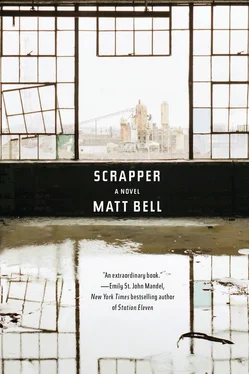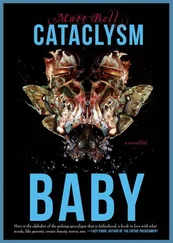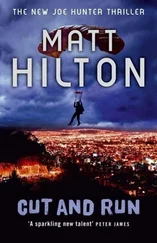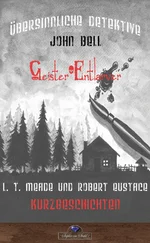Three days passed. The boy not molested or tortured or killed.
The boy merely kept.
Kept and watched .
Kelly had entered the low room too. There was the boy before and the boy after , and at the boy’s suggestion he remembered his own feeling of being split by entering the room: into the scrapper , perhaps, or else the salvor , two new ways of naming this second self he’d perhaps always known, recognized at last after a lifetime of mirrors.
THE VOLUNTEERS WELCOMED KELLY INTO their fold, pressed one of their orange jerseys into his hands, then pushed him to his knees and pulled it over his head. The men laid their hands upon him and they prayed for protection and his wisdom and grace in securing their city until Kelly was one of their number. The taking on of new duties, how immediately the office weighed upon him: He had not intended this. He had not intended any more than the acquisition of the uniform. A mode of access and anonymity, a man dressed up behind a symbol.
The watch met in schools and in churches and in bars, in backyards in the summer and in community halls in the winter, and wherever they met there would be the smell of barbecue and baked beans, piles of coleslaw and bread, all surrounded by men in their orange t-shirts, their orange jerseys and orange caps. They prayed before they ate, they ate before they invited the week’s speaker to the podium, and then Kelly was pointed out, made an example: This was the good man, the speaker said, in this bad world.
The speaker said this was the week a mother flushed her premature newborn down the toilet, then changed her mind, calling emergency services in time for firemen to cut the bawling baby loose from the pipe.
This was the week a woman beat her husband with a bat while he slept, too drunk to defend himself, as she had once been too afraid.
This was the week the homicide rate eclipsed the previous year’s and there were still six weeks left in the year.
This was the week the mayor cut the police force again, expanded the border of the zone another few blocks, darkened another row of streetlights, abandoned another portion of the city. The volunteers had dedicated themselves to keeping those streets safe when the police could not but they couldn’t hide their dismay, let their voices cry out in anger, the opposite of hallelujah, the cursing opposite of giving thanks.
This was a bad year, the speaker said. But this was also the year when Kelly saved a boy.
Like Lot in Sodom, he said. The good man who tries to rescue his city.
Afterward men swarmed to clap Kelly on the back or shake his hand or else they offered some more intricate greeting Kelly couldn’t follow or reciprocate. He had done what they had dreamed of doing: he had stopped a crime, he had saved a life. A child endangered, a victim rescued, a hero in their midst. They asked him what it had been like to carry the boy out of captivity and he said he didn’t know how to explain it. They wanted a story about a hero but he didn’t know how to say he hadn’t had the kind of feelings they wanted to hear. He didn’t know how to say that what he thought he had felt was responsible .
He couldn’t tell them about the scrapper , about the salvor , about the two voices he heard whenever he worked on the case notes. How there was a voice that wanted to punish the guilty. How there was a voice that wanted to protect the innocent.
Or not voices, exactly. Not voices but modes of thought, systems of organization, suggestions for action. Actions themselves, actions in waiting.
There were other support groups for other needs. After hours in a high school classroom, Kelly sat in a circle of chairs and listened again. This time the circle contained mostly women but it was the men he’d come to hear. When it was Kelly’s turn, he wanted to speak but the words wouldn’t come. He opened and closed his mouth, choked out a sound. The words wouldn’t come. My father. My father, who never took anything he didn’t ask for first. What had Kelly done to hold the words back. What would it take to reverse the damage. He shook his head, studied his hands. An older man touched his knee. The older man had been through something terrible, had done something equally bad. Kelly pitied the older man, the absolute safety of pitying in others what you wouldn’t pity in yourself. Kelly wanted to say what happened in his youth was worse because it had not left a mark, because it had not hurt, because he had only touched, not been touched. Because he had been asked to do it and he had agreed and even if it wasn’t fair — even if he had been too young to know better — even then what had happened to him had happened out of his own free will.
My father, so big upon his bones. All thick flesh, so that even where he was fat he was hard. In those years Kelly had believed in a world where you could be forgiven for every worst thing but later he threw away his rosary, revoked his right to those comforts, and so the world in which Kelly had passed on his hurt was a world in which his crime would not be forgiven, could not be redeemed or righted.
When he had paid for his vasectomy the nurses made him sign extra forms because of his age, because he was young and unmarried and childless. They asked him again if he was sure.
Yes, he said. He knew he would never have children of his own. Because he would not risk it.
But then the southern woman, who already had the only child she wanted. Then her boy.
How at first he had felt nothing. How he celebrated the nothing, the future he thought it promised. They bought their house, they moved in together, and for a long time nothing bad happened to anyone, for a long time when Kelly looked at her boy he had told himself he wanted to feel only love, something fatherly forming in the accumulation of days.
The collapse changed everything. The loss of his employment, their house. The constrained summer months they shared a single motel room, man and woman and child, when too often it was only the boy’s mother who left the room, who had her insufficient work to take her away.
The collapse changed everything but what if it merely sped the inevitable.
Just watch me, he had said, in the hot dark of the motel room, the night he and the boy were alone for the last time. After Kelly and the southern woman had fought again, after the woman took her purse and her car keys but not her boy. And how by then Kelly had loved the boy. How Kelly thought he would never hurt the boy but in his worst moment he knew he had somehow not known the boy’s name.
How in his worst moment he had said, Boy, just watch, but the boy had not wanted to watch.
What happened next had not taken long. When it was over Kelly grunted with relief, some clenching softening so fast it hurt, like the aftermath of a cramp. But then the horror of what he had done, what he had set his whole life against doing.
To have for so long restrained yourself from every urge and to have it buy you nothing. To still have to be yourself, everywhere you go.
The older man told Kelly this was a safe space but Kelly shook his head again. There were no safe spaces except those you made yourself. Safety could not be granted. Safety was the absence of anyone stronger or weaker. And always there was someone stronger or weaker, someone greater than, less than. The only true safety was the deepest kind of loneliness and for a time Kelly had chosen it. Now he was choosing something else, Daniel and Jackie, the found boy, the girl with the limp. Now the world’s every angle would be sharp with danger, for him and from him, until the case was closed. Until he found the watcher, the man in the red slicker. Until the boy was as safe as Kelly wanted him, as saved.
Читать дальше












